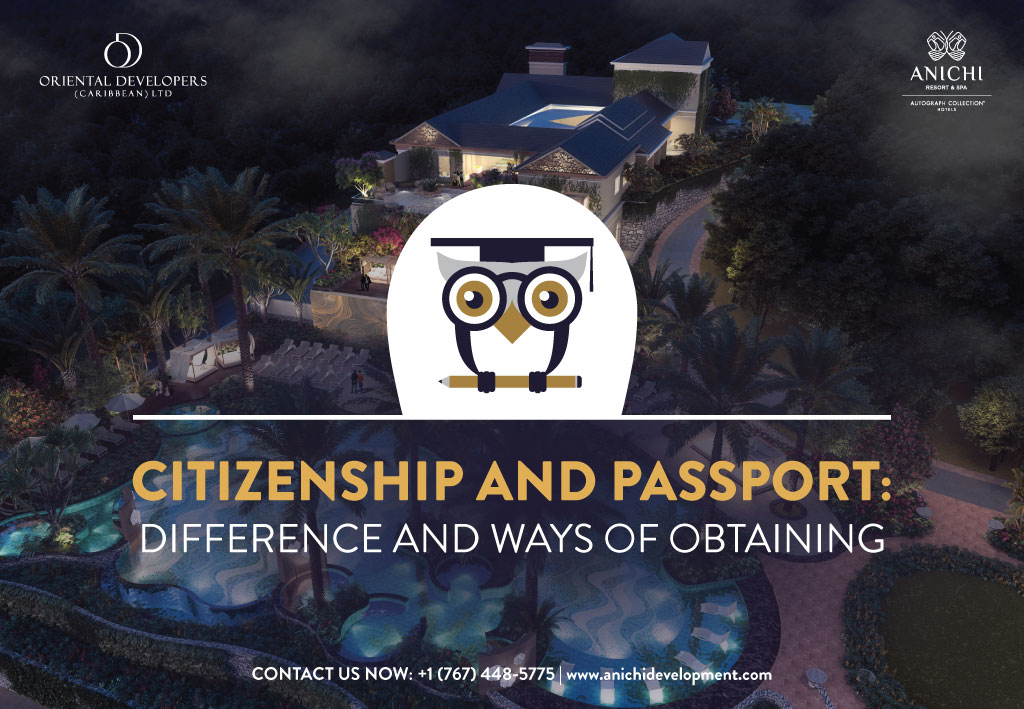

Dominica Citizenship by Investment Through Real Estate Purchase
Obtaining a second citizenship and a passport has become popular in the last two years around the world: in Russia, USA, in countries of Europe, Africa and Asia. Life has changed a lot, largely due to the coronavirus. More investors and businessmen realized that in an instant they could be trapped due to the closure of borders between countries, and a second citizenship is a viable tool not only to ensure freedom of movement, but also security. This article will highlight important information about citizenship and a passport, as well as what is the most comfortable way to obtain a second citizenship.
Citizenship is a stable legal relationship between a person and the state, expressed in the totality of their mutual rights, duties and responsibilities. The state recognises and guarantees the rights and freedoms of a citizen, protects and patronises him abroad. A citizen observes the laws and regulations of the state and fulfils its established duties. The totality of these rights and obligations constitutes the political and legal status of a citizen, which distinguishes him from foreign citizens and stateless persons.
In addition to the fact that everyone has the right to fundamental rights and freedoms, the state provides its citizens with additional rights: to elect and be elected, to participate in a referendum, to hold public office, to free medical care, sponsoring education in the best higher educational institutions around the world, easing the tax burden and doing business, and other privileges.
Persons with citizenships of two or more countries may have rights and obligations that differ from other citizens, depending on the adopted regulatory legal acts in these states or signed international treaties and agreements.
Passport is a state document proving the identity and citizenship of the owner when crossing state borders and staying abroad. A passport does not necessarily indicate the country of residence and is issued on the basis of obtaining citizenship upon the provision of a number of documents, the list of which depends on the method of obtaining citizenship and the legislative procedure of a particular country.
Each state independently determines the methods of obtaining citizenship, while the conditions and requirements for candidates may vary greatly but are clearly stipulated by the laws of the country. The most common options for obtaining citizenship in the world are:
Citizenship by birth:
By “Right of the soil” (Lat. Jus soli) – a person acquires the citizenship of the state on whose territory he/she was born. The parents’ citizenship does not matter. An exception may be the children of foreign diplomatic and consular workers, and in the event of war, the right does not apply to children born in the occupied territory and from the parents of a hostile state.
Citizenship by marriage:
The spouse of a citizen can apply for the citizenship and receive it through registration subject to several conditions:
The marriage must be legally registered in accordance with the legislation of the country where it was concluded.
The applicant for citizenship must be an honest person with a good reputation, be in good health (without dangerous diseases), know the state languages, have sufficient knowledge about the responsibilities of a citizen of this state, undergo an interview and take the oath.
The main disadvantage of this option: the application can be considered for a very long time without guarantees for a positive decision.
Citizenship by registration:
To apply for citizenship through registration, foreign citizens should meet the following conditions:
Reside in the country for a long time (from five years or more).
With this option, the application is considered even longer and also without guarantees for a positive decision.
Citizenship by naturalisation:
Foreign citizens can apply for themselves and the entire family to acquire citizenship by investment, contributing the amount established by the government of the country, and obtain citizenship through naturalisation. The application is considered within a specified time frame and involves due diligence. The main condition for successfully obtaining citizenship is the impeccable reputation of the main investor and the truthfulness of the data provided in the application.
For five consecutive years, the Dominica Citizenship by Investment Programme has been ranked first in the world among active citizenship by investment programmes, according to the CBI Index, compiled by experts of the publication to the Financial Times.
The accumulated experience over 28 years of flawless operation of the programme allows the Dominica Government to offer the most valuable and comfortable option for obtaining citizenship:
To find out more about the process of obtaining Dominica citizenship through real estate investments, please contact us.